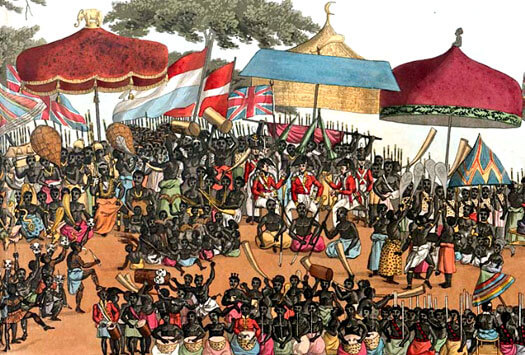The Ashanti Empire was one of the most endearing, richest and powerful dynasties to ever exist in West Africa. It offers individuals and businesses the opportunity to study “the kingdom of gold” which flourished between c.1695 and the rise of British colonial rule in the late 19th century.
The 4 entrepreneurial and small business lessons from 18th century Ashanti Empire
#1 Develop a strong brand
For all business owners and entrepreneurs, branding is a key marketing practice that distinguishes it products and service from its competitors. Branding does not only play a distinguishing role but provides recognition to the company, increase business value by giving the company more leverage in the industry and generate new customers.
It appeared Ashanti understood the importance of branding and sought to brand themselves with gold. Gold was the major product of the Ashanti Empire. The importance of gold to Asante empire could not be overemphasized. Gold was eloquently sewn into royal clothing, made into ornaments and exquisitely carved into symbolic shapes. Osei Tutu made the gold mines royal possessions with gold dust becoming the circulating currency in the empire.
The most notable of all the Ashanti gold branding uniqueness was that of the Golden Stool, which Osei Tutu argued represented the ancestors of all the Ashanti. The Golden Stool legitimized his rule and that of the royal dynasty that followed him. This branding of gold brought wealth to the empire as it traded heavily in gold in the 1700’s.
ALSO READ: Five branding mistakes you should avoid in your small business
#2 Not all money/opportunity is good money/opportunity
Small business owners and entrepreneurs can get caught up in ‘quick or easy money/opportunity’ that may quickly bring prosperity to their business but may have moral questioning or negative repercussions in the long-term.
By the early 1800s, Ashanti had become a major exporter of enslaved people. They conquered neighbouring towns and dynasties to meet up with the growing demand for slaves in exchange for manufactured goods, most notably, firearms. This move by the Ashanti was heavily wrong on all accounts. From violation of human rights and freedom to the economic brain drain in the country, slavery is the most inhumane practice to ever exist.
#3 Recognizing opportunities
The Ashanti empire recognized and seized an opportunity in slavery that further expanded its power and influence. Though wrong, it teaches young entrepreneurs and small business owners to always be on the lookout for opportunities, the right opportunities.
Many opportunities exist that young businesses and entrepreneurs must seek and exploit. By researching into trends and seeking out innovative problem-solving approach, entrepreneurs can take advantage of the numerous opportunities that exist.
#4 Take-out your competition
To expand its influence and power, the Ashanti Kingdom, from 1790 until 1896, was in a continuous state of warfare. Most of the wars gave the Ashanti empire the opportunity to acquire more slaves for trade.
In today’s world, taking-out the competition has taken more of a subtle approach. It involves researching into the strategies of your competitors and deploying a much better strategy to gain new customers or outreach. When entering into any market it is important to research the competition. This will provide marketing tools to seize and quickly scale your business.










